Archibald Ramsay, British MP and Bigot
The history of England’s flirtation with fascism before World War 2 is a fascinating one. The philosophy of absolute authority had a great draw for an aristocratic upper-class who had seen their grip on authority gradually loosen over the previous century. One of the most notable such dalliers was the King himself, and it’s often claimed that this was what drove Edward VIII from his throne in 1936. But all such behaviour, the national myth proclaims, came to a stop once war broke out. The truth, of course, is far from so simple. Deep-seated attitudes did not change overnight, and many still believed that England belonged among the Axis and not the Allies. Some were even driven to act on this belief, and one of the most notable such was a Member of Parliament named Archibald Ramsay.
Archibald Ramsay was born in 1894 into the most privileged of classes, the aristocracy. At the time his parents were living in India, but they made sure that young Archibald knew that he was British, and he grew up both intensely patriotic and deeply religious. His great-uncle was a Scottish earl, and due in part to that family connection Archibald attended the most prestigious (and exclusive) boarding schools in England – Eton college. Only the most elite of British males are allowed to attend, and the connections they forge there help to maintain their position atop the UK’s class pyramid. From there Archibald went on to the Royal Military College at Sandhurst, where he was trained as an army officer. On graduating in 1913 he joined the Coldstream Guards, one of the oldest regiments in the British Army. So far his life had proceeded on rail tracks along the same course that a thousand other sons of privilege had followed. And then Archduke Franz Ferdinand was shot, and everybody’s life went off the rails.
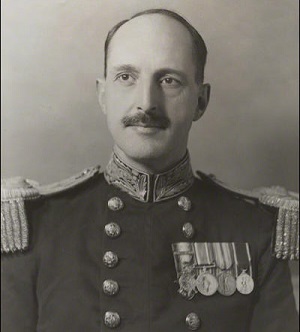
The Coldstream Guards were among the first British troops who went to France, and they took part in the early mobile part of the war as the Germans sought to overwhelm France. As the “Race To The Coast” ended with the infamous trenches laid down, they were among those there to hold the line. Like many such units, they suffered immense casualties. Officers were a prime target, but common soldiers were far from immune. On one occasion the first battalion were almost wiped out, and mass casualties were the norm rather than the exception. In 1916 Archibald became one of those casualties, receiving a severe head wound and a ticket back to England to recover.
Archibald’s injuries were severe enough that he was unable to return to the front, but not so severe that he could not contribute to the war effort in other ways. He soon recovered enough to take a job at the War Office. There he met Ismay Crichton-Stuart, daughter of a Viscount and widow of an officer and MP who had been killed in the trenches. She was 35 and Archibald was only 23, and she already had three children from her first marriage. But they fell in love, and they didn’t let other considerations get in their way. They were married on the 30th April 1917. In 1918 Archibald was transferred to Paris, where he stayed until the end of the war, and for some time after. His military career came to an end in 1920, when he retired at the rank of Captain.

After he left the army, Archibald spent some time as a corporate executive in Scotland. This allowed him to increase his fortune, and he was soon able to purchase Kelly Castle in Arbroath, Scotland. This became his family home. He also became an outspoken critic of the new Soviet government in Russia and of communism in general, spurred on by his religious views. Soon, he was drawn into politics. His wife may have been a catalyst for this, as she had also been the one who encouraged her first husband to take up politics. In 1931 Archibald Ramsay was elected as an MP for the Scottish Unionist Party. [1]
“Jock” (as he was nicknamed by his fellow MPs) was a popular man in Parliament, and had a knack for getting people to like him. It helped that he had no real ambition towards cabinet postings, though he did have his own drives. His politics were right-wing, and became more so over time. He was well-known as a vehement anti-Communist, and was sympathetic to the Nazi government who took over Germany shortly after he was elected to Parliament. It was this sympathy that put him on the radar of Alfred Rosenberg.
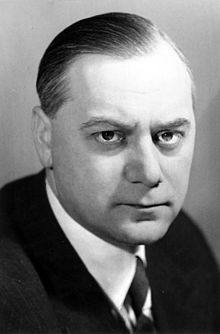
Alfred Rosenberg’s position in the Nazi party was simple: construct racial theories that put them at the top of the pile. Officially he was the leader of the foreign political office, but when your entire persona is based around declaring that “Nordics” are the supreme race then it puts a damper on outreach efforts. When Rosenberg visited England in 1933 he laid a wreath with a Nazi symbol at the Cenotaph. An army veteran and Labour candidate named James Edmonds Sears took it and threw it in the river. He was fined 40 shillings.
Rosenberg’s real tool for foreign outreach was Nordische Gesellschaft – the Nordic Society. Through it he did his best to sway Scandinavian countries to the Nazi philosophy. In their racist pseudoscience, England was a “Nordic” country, so Rosenberg set up a branch there as well. It was named the Nordic League, and Archibald Ramsay was asked to be its leader. Clearly unaware that Rosenberg was doing his best to ban Christianity in Germany (and replace it with a “religion of pure blood”), Archibald accepted.
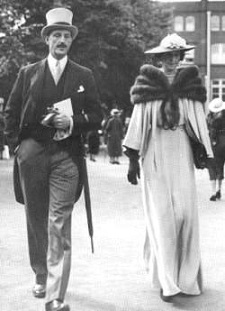
The Nordic League was part of a tangle of anti-semitic and white supremacist groups active in England in the mid to late 1930s. The most famous was the British Union of Fascists, and it’s telling that their leader Oswald Mosely refused an invitation to join the Nordic League as their rhetoric was “too extreme”. He didn’t ban BUF members from joining it though, and many did (including Lord Haw Haw himself, William Joyce. The NL shared a headquarters with the White Knights of Britain, a pseudo-Templar society based on the Ku Klux Klan. The Nordic League were also linked through Ramsay to many other groups, as he organised the “Coordinating Committee” to try to get them all to align. However it soon collapsed, as did many of the groups.
The outbreak of the Spanish Civil War in 1937 was a flashpoint for many of the tensions in Europe at the time. When a group of right wing generals started a coup against the left wing government, both the USSR and the fascist governments of Europe saw it as a chance to advance their own political causes. Foreign troops and “military advisors” poured in to the country. Archibald, of course, supported Franco (or more accurately, he vehemently opposed the Spanish Communists). To lobby for that view he formed the “United Christian Front”; an ironic name as it was denounced by such figures as the Archbishop of York.
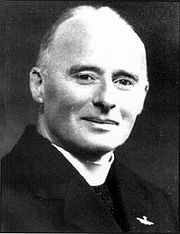
Archibald’s antisemitism was now beginning to come more and more to the fore in his politics. In Parliament he was a frequent denouncer of Leslie Hore-Belisha, the Secretary of War, because he was Jewish. [2] Archibald said that he would “lead us to war with our blood-brothers of the Nordic race in order to make way for a Bolshevised Europe.” In January of 1939 his wife Ismay gave a speech to the local business club where she defended Hitler and claimed that the Jews controlled the media and were behind the Communist revolutions. This led (unsurprisingly) to a letter from a Scottish rabbi accusing her of baseless antisemitism. Archibald then wrote to the paper quoting a book by an Irish Catholic priest named Denis Fahey called The Rulers of Russia, which led to the local Presbyterian ministers uniting to condemn their MP and defend the rabbi.
The resulting controversy led to Archibald being warned by his Conservative party colleagues to keep his views discreet. Though he publicly complied, in private he ranted that the Conservative party relied on “Jew money”. It was to combat this perceived strain in his party that Archibald founded The Right Club, which brought together all the notables of British fascism. Its members included mainstays like William Joyce but also some of the highest born aristocrats in the land such as the Duke of Wellington the Duke of Westminster, and the Earl of Portsmouth. (Another aristocratic member was David Freeman-Mitford, Baron of Redesdale and father of the Mitford sisters.) The logo of the club showed an eagle killing a snake, labeled with the initials “P.J.” for “Perish Judah”. Not the most subtle of symbols.
The outbreak of World War 2 was not handled well by Archibald. He responded by writing an antisemitic parody of Land of Hope and Glory the following day. Worse was to come for him though. On the 22nd of September two members of the Right Club were interned as threats to national security, which Archibald furiously condemned in Parliament. More controversial was a question he asked in Parliament in early 1940 about a Nazi propaganda station – a question that just so happened to include the exact frequency and the times it broadcasted. He was accused of using Parliamentary Privilege to advertise the station, and was denounced by many as a closet German sympathizer. His critics did not know it, but at the time his doom was already sealed, thanks to the efforts of British counterintelligence.
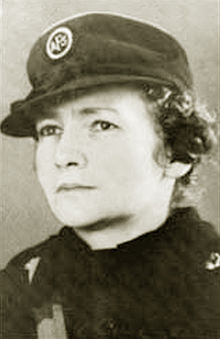
Anna Wolkova was the daughter of the last naval attache at the Imperial Russian embassy in London. After the Bolshevik revolution, the family sought asylum in the UK and changed their surname to Wolkoff. She inherited her right-wing political views from her father, along with her antisemitism. She was a Nazi sympathiser who made many trips to Germany, and she was also the proprieter of a dress-making business that had Wallis Simpson among its clients. Ties to a foreign power and to the Royal Family naturally made her a target of MI5 surveillance, and it was to keep an eye on her that Maxwell Knight (MI5’s Director of Intelligence) sent his agent Joan Miller to join the Right Club. Their primary meeting place was the tearoom that Anna’s father had opened for Russian refugees twenty years earlier, and Anna herself was deeply involved in the club. Joan herself also rose in the ranks as she had a fictitious cover that allowed her to get tidbits of Whitehall gossip for the Club – enough to make her a useful asset in their eyes.
Joan wasn’t the only agent that Knight had watching Anna. One of his most useful agents was Helene Louise de Munck, a Belgian-born woman who posed as a fortuneteller to the credulous people of London. She flattered Anna by giving her fortunes predicting that she would become great, while hinting at her own fictitious Nazi sympathies. Knight set up a sting where Helene told Anna that she had contacts in German-held Belgium, and then Anna was provided by another agent with a fake “coded letter” to be got to the fugitive traitor William Joyce. When Anna handed the letter over to Helene, it was proof that she was acting as an enemy agent. Anna then confirmed this by creating her own coded letter with information for William Joyce and asking Joan to use her contacts at the Italian Embassy to get it to him. At the time Italy had not yet officially joined the war, but its friendly relationship with Germany allowed it to be used as a channel for intelligence.
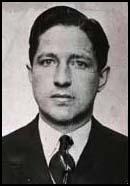
Anna was the one who brought Tyler Kent into the Right Club. He was an American cypher clerk who had previously been posted to Moscow, and had helped several White Russian exiles flee the country. He was also pro-Fascist and was convinced that America should either stay out of the war or join on the German side. To strengthen the German hand, he showed some of the documents related to American secret promises of support for the Allies to Archibald Ramsay, in the hope that he could fight them politically. He also leaked copies of the telegrams being passed between William Churchill and Franklin D Roosevelt to Anna, who passed them on (through the Italians) to Germany. Unfortunately for him the British’s own spy service discovered that the Germans had the telegrams, and since they were already suspicious of Tyler they decided to act.
In May of 1940 Knight told his boss Guy Liddell about the spy ring operating through the Right Club. Lidell contacted the US Ambassador to the UK, Joseph Kennedy (father of future US President John F Kennedy) and asked him to waive Tyler’s diplomatic immunity. Kennedy did this as he knew that the information Tyler was leaking could have allowed Germany to influence the upcoming US Presidential election. Anna and Tyler were arrested, and Tyler’s flat was searched. Officers found nearly two thousand classified documents he had taken from the embassy, along with something potentially even more explosive. Tyler Kent had been given a copy of what became known as “Archibald Ramsay’s red book” – the complete membership list of the Right Club.
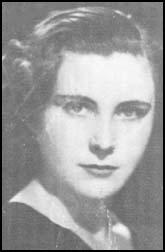
Anna and Tyler were tried in secret, as were most spies uncovered during the war. Tyler was sentenced to seven years, [3] while Anna received a ten year sentence. [4] Her sentence was higher because she was a British citizen, while Tyler was a foreigner. Archibald Ramsay was not charged, possibly due to a lack of evidence. But he was also clearly no longer to be trusted in Parliament. So under the same internment legislation that he had protested against the year before, Archibald was imprisoned without trial as a danger to the state. He was sent to Brixton Prison, amid a tumult of publicity and scandal.
When the existence of the Red Book became known, some politicians started demanding that the government publish it and let them know who had been a member. The government refused to do so, officially on the grounds that they didn’t know if it was genuine and they did not want to libel innocent people. Unofficially it was probably because (as was found out in 1989 when it was eventually released) the list included quite a few Tory MPs and Lords. The intelligence services did definitely make use of the list to direct their inquiries during the war, and more than a few of the names on it wound up in Brixton alongside Archibald.
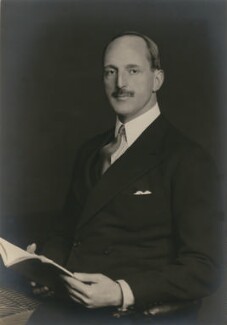
The New York Times wrote an article on the Right Club affair shortly after the fact, though since most of the facts were unknown they plugged the gaps with speculation. Among other things they said that Archibald had been given information by Tyler Kent that he had passed on to the German embassy in Dublin. Archibald sued for libel, and the case came to court during his internment. Archibald won the case, as there was no evidence of him doing what the article said, but he was awarded damages of only a single farthing. This was the traditional way of saying that while the statements were technically libelous, they had enough spirit of the truth in them that they could not be considered to have harmed the plaintiff.
Since Archibald was not charged with a crime he did not forfeit his seat in Parliament. This allowed him to submit questions to be asked of the Prime Minister, with one of those he submitted asking for details of the number of Jews serving in the British army. He was eventually released in September of 1944, after a sustained campaign by several Tory MPs. At least one MP left in protest when he first re-entered the chamber. The most notable action he took during his remaining time in Parliament was to table a motion asking that the “Statute of the Jewry” be officially reinstated. This was an antisemitic law that had been passed in 1275 by Edward II that had (among other things) ordered all Jews to wear a yellow star sewed onto their clothes. The motion was not put to a vote.
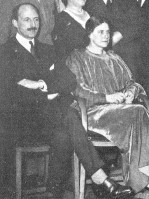
Archibald Ramsay did not contest his seat in the 1945 General Election, probably not by choice. He retired back to Arproath where he worked on his “autobiography”. It was released in 1952 as The Nameless War, and in addition to casting Archibald as a misunderstood hero it was also a work of revisionist historical fantasy. Among the more notable flights of fancy was the assertion that John Calvin (the founder of Calvinism) was actually a Jew named Cohen. He also claimed that the English Civil War had actually been arranged by the Jews in order to get “their creature and hireling Cromwell” to permit Jews to immigrate to England once again. The Parliamentary side in the Civil War he denounced as “Communists”, and the foundation of the Bank of England shortly after the restoration of the monarch was also engineered by the conspiracy. Of course the French and Russian revolutions were also Jewish/Communist plots, according to Archibald. His interpretation of World War 2 plunges even even further into fantasy, of course.
Archibald Ramsay died in 1955. Sadly his views did not die with him. “The Nameless War” remains a popular text among the more lunatic fringe of the far-right, and to this day there are those who would label him a “hero”. But he wasn’t. He was a man who was consumed by hatred for people who he did not even know, and who allowed that hate and his own conviction that he could not be wrong to twist him into a monster. That he did not betray his country was more a matter of lack of opportunity than of lack of will, but the most terrifying thing is how many even at the time were sympathetic to his views and to his cause. Because history is never quite as neat or as black and white as people like to think.
Pictures via wikimedia and Spartacus Educational except where stated.
[1] At the time the Scottish Unionist Party was officially a separate organisation from the English Conservative Party, though they were closely allied. Nowadays the two have merged into the Conservative & Unionist Party of Great Britain.
[2] Hore-Belisha was eventually sacked by Chamberlain in January 1940.
[3] He was released and deported to America after the war, where the State Department surprisingly decided not to prosecute him.
[4] Anna went to prison swearing that she would kill Joan Miller (who married Maxwell Knight after the war). Her British citizenship was revoked after her conviction, so on her release in 1947 she had to find sanctuary in fascist Spain.
